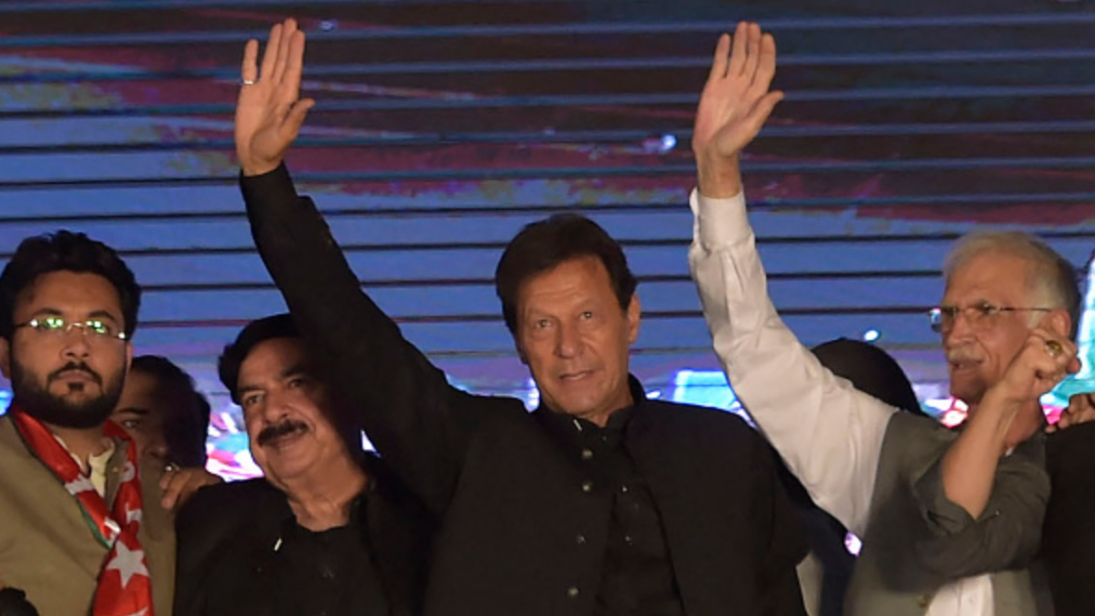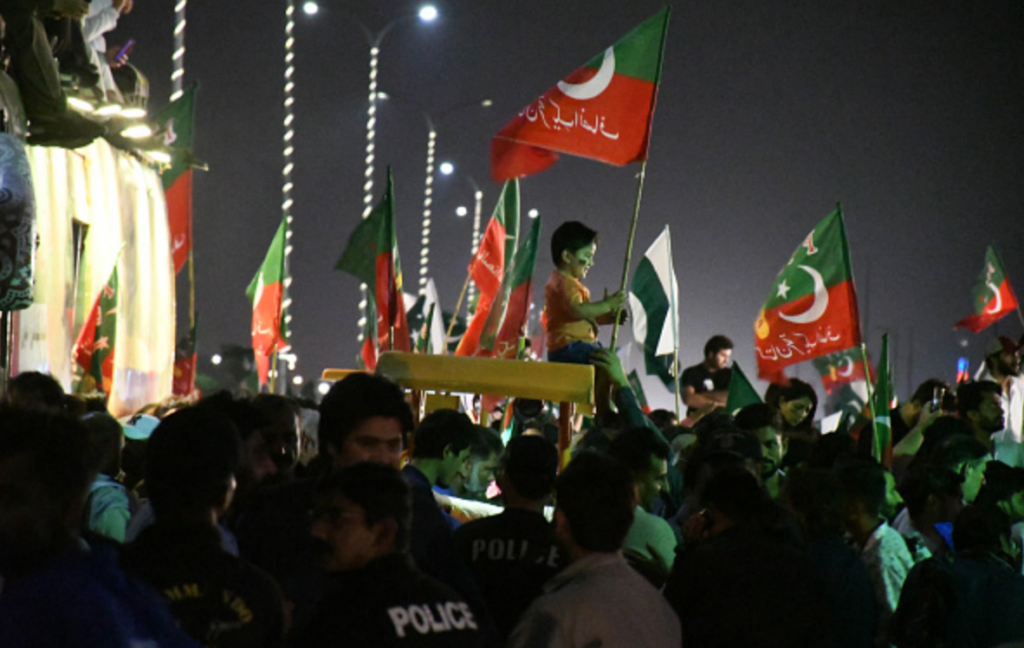
It was past midnight on April 9 that Pakistan’s parliament successfully managed to end almost four years of rule by Imran Khan and a crisis that had begun to look like an intense but emotionally draining soap opera. Khan had refused to face a no-confidence vote tabled by the political opposition on March 8, delaying a simple process and causing multiple institutions including the judiciary to get involved. Khan tried to thwart the motion by unconstitutionally dismissing the parliament and announcing early elections, actions not permitted pending the motion against him.
Khan justified these moves by arguing that the political opposition had conspired against him on instructions from the United States and that he had concrete evidence of such a plan hatched in Washington DC. The Parliament was finally restored after a Supreme Court verdict on April 7, allowing the no-confidence motion to proceed on April 9. The high drama of Khan’s removal reflects the larger problem of his politics—his inability to conform to institutional rules or demonstrate respect for anything above his own personal interests, including the constitution. In the process, he further strengthened the powerful military whose hands were as much visible in his selection in 2018 as they are in his removal in 2022.
Khan’s legacy
A former cricketer, Khan took pride in not being a politician. Indeed, in his political career spanning about two decades, he never learned the art of adjustment, honoring commitments, or following principles. He remained a good agitator, a master in building a popular narrative and catching people’s imagination, but without the capacity to deliver. His ascent to power in 2018 was marked by lofty promises of solving corruption, youth unemployment, and speedy recovery of the economy in 90 days. Unfortunately, these were never fulfilled due to poor governance and misplaced priorities.
The high drama of Khan’s removal reflects the larger problem of his politics—his inability to conform to institutional rules or demonstrate respect for anything above his own personal interests, including the constitution.
At the end of the day, Khan will be remembered for targeting the opposition rather than focusing on economic challenges such as inflation that rose to 13 percent—which also pushed up food inflation to 15.1 percent in March 2022—driving millions towards grinding poverty. Unable to increase exports or tax collection, Khan’s government had become highly dependent on Pakistani expatriate remittances, domestic and international borrowing and a financial bailout from the IMF. Ultimately, Imran Khan tried to turn the tide of popular displeasure with his government, especially in the populous and politically-significant province of Punjab, by suggesting that the Biden administration had conspired with Pakistan’s opposition to bring about “regime change” in the country.
Though Pakistan did well in fighting the COVID-19 pandemic, Khan’s overall record of governance has been weak. More importantly, during his tenure, Pakistan’s society was pushed towards greater polarization and an increase in religious fanaticism. His constant reference to recreating the 1400 years old “riyasat e Madina” (the state of Madina) through bringing critical changes to the education system by increasing Islamic religious content encouraged youth to look at the world increasingly in black and white. This had severe repercussions such as the killing of a Sri Lankan national at the hands of a religiously incensed extra-judicial vigilante mob in eastern Pakistan in December 2021. In his last days in power, the sloganeering from Khan and other prominent PTI leaders encouraging abuse of anyone that opposed him only furthered intolerance and fascist tendencies in the society.
The Military’s Enduring Role
Nonetheless, rather than the weak economy or social polarization, what eventually brought his temporary political rule tumbling down were his growing differences with the military, which has been accused of “selecting” him into electoral victory and eventually power in 2018. At that time, both the Pakistan Tehreek-e-Insaf (PTI) and the military leadership lauded this as a new kind of method of governance in which the civil and the military would work together and remain on the same page. Touted as a hybrid regime, work was divided between civilian and military leadership with the latter responsible for all strategic decision-making particularly relating to foreign relations and national security.
Khan—better known for winning the Cricket World Cup in 1992, agitational politics, and fundraising for his cancer hospital—pushed other responsibilities on the army chief, General Qamar Javed Bajwa. The general and his team were seen meeting the country’s top businessmen and industrialists and instructing them on the way forward. Sources involved in financial planning claim that even the Inter-Services Intelligence (ISI) chief was involved in reframing existing agreements with International Power Providers and similar businesses. In this respect, any criticism of Khan on poor governance ought to be shared by the military, which not only brought a man lacking passion for governance to power but also constantly interfered with his work thereafter.
During his years in power, Khan expanded the military’s intervention in the state and society horizontally. In the end, there was not a single key institution of the state that was not run by a uniformed officer either serving or retired. Of course, the military never took responsibility for adverse decisions and deflected criticism toward the government. The army chief also expanded his engagement with other critical sectors like media and academia, as well as universities around the country to build a positive narrative for the army rather than the civilian government.
The hybrid relationship that looked cosy in the beginning slowly soured, starting with the government’s delayed decision to extend the army chief’s tenure due to Khan’s reluctance in 2020. Then, a decision in favor of General Bajwa required the intervention of both the political opposition and the Supreme Court. Friction between the army chief and the prime minister intensified to boiling point due to the former’s decision to transfer the Director General of ISI, Lt. General Faiz Hameed to become the Corps Commander Peshawar. Khan viewed Hameed as a guarantor of his political survival and victory in the next election and thus delayed the transfer as much as he could. Though in the end, the army chief’s will prevailed, it deepened the general’s suspicions about Imran Khan, who had by then begun to behave like all previous politicians in power—aiming to manipulate the military institution for furthering his own strength.
And like those in the past, Khan soon learned that in Pakistan, the prerogative of manipulating institutions for one’s advantage lies with the armed forces and not individual civilian politicians. Indeed, Khan’s predecessor Nawaz Sharif had made the same mistake in 1999 when he tried to use his power to change the army chief. Sharif’s attempts resulted in bringing the military back to power, which has luckily not happened this time. Meanwhile, Pakistan’s military has learned the importance of securing its institutional legitimacy from history. It is not necessarily inclined to take over every time but has found new ways of influencing political conditions.

Future Prospects
Rumors in Islamabad reported by several media channels such as the BBC, Reuters, and Dawn suggest that there was some form of a showdown between the army chief and Khan as the latter moved very late on April 9 to remove the general. Sources also suggest that Khan was egged on to a confrontational path by some of his close aides. While the army’s re-entry into politics was avoided by throwing Khan under the bus, his departure yet again indicates the deeper issue with Pakistan’s political system—generations of civilian politicians have failed to build durable institutions and instead fallen prey to the bad advice of their cabals.
Thus far, [Khan] appears on a confrontational course with both the new political government and the armed forces.
Imran Khan is also a failed experiment of an urban middle class that remains suspicious of traditional politicians and saw him as a credible alternative. This includes people from within the armed forces and the Pakistani diaspora, among whom he remains popular. A return to power, like in the case of other political players, depends on his capacity to keep his followers energized for the long haul while he remains out of power, and keeping the military, which is the source of power, interested in him. Thus far, he appears on a confrontational course with both the new political government and the armed forces. The army as an institution and the army chief as an individual seem to be in the firing line of his supporters and social media followers that blame both for Khan’s ousting.
Although the army condemned the propaganda by the PTI supporters in the 79th formation commander’s meeting at the GHQ, Khan’s support base and continued popularity does pose a challenge. It is likely to make the newly appointed interim government’s decisions, especially on foreign policy, suspect and subject to greater negative propaganda. Unless Khan changes his confrontational tactics, he could also run the risk of the military targeting his party to disintegrate its structure and thus pushing him into political oblivion where he was during the 2008 elections. For the new government, on the other hand, the biggest challenge is bridging societal differences and presenting themselves as politically more acceptable, which can only happen by turning the economy around.
Editors’ Note: A version of this piece originally appeared on 9DashLine and has been republished with permission from the editors.
***
Click here to read this article in Urdu.
Image 1: Abdul Majeed/AFP via Getty Images
Image 2: Anadolu Agency via Getty Images


